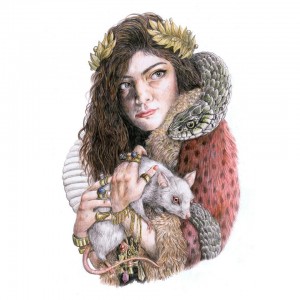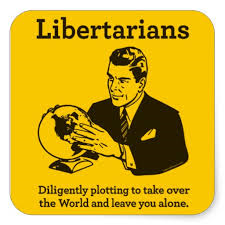 The song “Royals” by seventeen year-old artist Lorde, from New Zealand, was a surprise hit of this past summer. Debuting at #1 on its release in New Zealand in March, by early October the song had reached #1 on the Billboard Hot 100 in the United States. What makes the song significant from a Christian theological perspective, however, is not its popularity, but rather its theme: the significance of everyday life and the rejection of a consumerist, celebrity-obsessed lifestyle. The message of the song has clearly struck a chord with many people, and Christians should celebrate this fact while also recognizing the limitations in the song’s vision.
The song “Royals” by seventeen year-old artist Lorde, from New Zealand, was a surprise hit of this past summer. Debuting at #1 on its release in New Zealand in March, by early October the song had reached #1 on the Billboard Hot 100 in the United States. What makes the song significant from a Christian theological perspective, however, is not its popularity, but rather its theme: the significance of everyday life and the rejection of a consumerist, celebrity-obsessed lifestyle. The message of the song has clearly struck a chord with many people, and Christians should celebrate this fact while also recognizing the limitations in the song’s vision.
Catholicism recognizes that there are signs of grace present in culture, including pop culture, even in works that are not explicitly Christian. Therefore Christians should be able to see hints of the Gospel in the mass media, including popular songs, television shows, and movies. These hints of the Gospel illustrate that the human heart longs for God, even without the explicit faith to articulate this longing. Christians are also called, however, to pose questions to their culture, in order to better explain how the Gospel can potentially respond to the longings of the human heart. In that spirit, I believe that “Royals” provides a compelling critique of contemporary consumerism and celebrity culture, but also struggles to propose a real alternative way of life. This gap can be filled by the Gospel, which fulfills the longings expressed in the song and provides a sense of purpose lacking in the vision offered by the song.
The premise of the song is a contrast between the humble lifestyle of the narrator and her friends, on the one hand, and the luxurious, frivolous lifestyle portrayed in contemporary popular music on the other. The song seems especially critical of wild, drug-enhanced partying: “But every song’s like gold teeth, Grey Goose, trippin’ in the bathroom/ Blood stains, ball gowns, trashin’ the hotel room.” But the lyrics also challenge sheer consumerist excess, achieving a bit of rhetorical excess of its own: “But everybody’s like Cristal, Maybach, diamonds on your timepiece/ Jet planes, islands, tigers on a gold leash.” Although the narrator refers to the fantasy life portrayed in popular music, I think the real point, however, is not to contrast the narrator with the pop artists, but rather with her fellow young adults who are enchanted by the fantasy of consumerism and celebrity worship. Note the shift from “every song’s like…” in the first set of lyrics quoted above to “everybody’s like…” in the second. The colloquialism “everybody’s like” suggests that the point is not that people actually live this way, but that they can’t stop talking about and can’t stop thinking about the luxuries listed by the narrator.
In contrast, the narrator describes the sufficiency of her own simpler lifestyle. For example, although the narrator at first expresses some doubts about her own status – “And I’m not proud of my address/ In the torn up town/ No post code envy” – later she expresses a sense of satisfaction with her condition: “My friends and I we’ve cracked the code/ We count our dollars on the train to the party/ And everyone who knows us knows that we’re fine with this/ We didn’t come from money.” The line “We’re fine with this” suggests a sense of “enough,” that the joys of everyday life are sufficient for being happy. She and her friends have “cracked the code,” suggesting that they have discovered a secret unknown to most of their peers. It is interesting that the narrator and her friends are themselves on the train on their way to a party; clearly it is not the sort of party described earlier, whose pleasures are based on a fixation on things rather than persons, and on alienation from other persons through the use of drugs and alcohol, but rather the sort of party where friends just hang out together. As the narrator claims, “We crave a different kind of buzz.”
This celebration of happiness in everyday life is reinforced by the video for the song, in which two young men engage in everyday activities such as eating breakfast, listening to music, and riding the bus. Cleverly, the two young men visually evoke Prince William and Prince Harry through their hair color, evoking the lyrics’ own inclusion of royalty in the celebrity culture under critique: “And we’ll never be royals/ It don’t run in our blood/ That kind of lux just ain’t for us.”
Royalty provides the dominant metaphor for the narrator’s alternative to celebrity-obsessed culture, but also reveals the underlying ambiguity in the song. The narrator sings, “Let me be your ruler, you can call me Queen Bee/ And baby I’ll rule, I’ll rule, I’ll rule, I’ll rule/ Let me live that fantasy.” That last line, “Let me live that fantasy,” might suggest that the narrator has failed to leave the realm of fantasy after all, simply rejecting one for another, but I think her appeal to “fantasy” is better interpreted as recognizing the need for imagination or vision in how we live our lives. I think the deeper problem is the lack of explanation of what the narrator means by “I’ll rule.” Rule what? The lack of an object here suggests that what the narrator means by ruling is the exercise of will, doing what one wants, regardless of what it is. The song presents us with a contrast between youth who mindlessly accept the fantasy given to them in popular music and the narrator and her friends who choose their own path, but the narrator does not have a clear sense of her own vision of the good life. “Life is game without a care,” the narrator claims. This same aimlessness can be found in the video, in which the most significant event in the young men’s day is a boxing match in their living room.
There is also a noticeable absence of community in the video. We are not introduced to any family members of the young men, and although we are provided a street scene with a row of suburban houses, there is nobody in the yards or walking down the street. The song together with its video presents us with young people who rightly question the consumerist and celebrity-focused culture that bewitches so many of their peers, but who are also adrift, with little guidance from family or the broader community about what an alternative vision of the good life could be like. The lyrics even hint at a dark side to this aimless willfulness. As I already noted, the narrator says to an unspecified “you,” “Let me be your ruler, you can call me Queen Bee.” Why does the narrator feel justified in ruling over the other? What would it mean to be ruled by her? The narrator gives us reason to be suspicious, elsewhere stating, “I’m in love with being queen.” The ideal of aimless willfulness, without any larger purpose, risks turning into the will to power.
It is no coincidence that “kingdom” is one of the most important symbols in Christian theology, the Kingdom of God. The continuing appeal of royal families in our democratic age long after monarchs have had any significant political role, not to mention Lorde’s desire to be “Queen Bee,” perhaps suggest a deep longing for the reality expressed by the idea of the Kingdom of God. Yet God’s Kingdom subverts our expectations. The Kingdom preached by Jesus is a kingdom of the everyday, like Lorde’s; it is a kingdom of day laborers, lost coins, mustard seeds, bread and wine. But it is also a kingdom of service rather than power: “You know that the rulers of the Gentiles lord it over them, and the great ones make their authority over them felt. But it shall not be so among you. Rather, whoever wishes to be great among you shall be your servant; whoever wishes to be first among you shall be your slave. Just so, the Son of Man did not come to be served but to serve and to give his life as a ransom for many” (Matt. 20:25-28). Belonging to the Kingdom of God gives us a sense of purpose, to love and serve one another.
Christians should rightly celebrate the fact so many people are drawn to the anti-consumerist and anti-celebrity message of “Royals,” especially when other hits of the summer included such out of touch meditations on the life of a celebrity as Lady Gaga’s “Applause” and Jay-Z and Justin Timberlake’s “Holy Grail.” The song demonstrates a longing for a way of life that is deeper and more authentic than the materialism characteristic of so much of our culture. On the other hand, Christians must do more to show that the Kingdom of God so central to the Gospel provides a substantial vision of the good life, one focused on service and love, which is more fulfilling than carefree aimlessness. In other words, Christians must give the world compelling evidence that “we’ve cracked the code.”





Thank you for this inspiring article. We must remember that the Lord inspires artists, and people with the opportunity to influence large audiences, to share principles of truth as a means of blessing the human race and bringing them closer to God. It’s wonderful to see artists use their celebrity to produce positive change in the world rather than just make a profit.